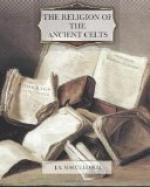[1071] Mela, iii. 2.
[1072] Mommsen, Rom. Gesch. v. 94.
[1073] Bloch (Lavisse), Hist. de France, i. 2, 176 f., 391 f.; Duruy, “Comment perit l’institution Druidique,” Rev. Arch. xv. 347; de Coulanges, “Comment le Druidisme a disparu,” RC iv. 44.
[1074] Les Druides, 73.
[1075] Phars. i. 453, “Ye Druids, after arms were laid aside, sought once again your barbarous ceremonials.... In remote forests do ye inhabit the deep glades.”
[1076] Mela, iii. 2.
[1077] Tacit. iii. 43.
[1078] Ibid. iv. 54.
[1079] Ausonius, Prof. v. 12, xi. 17.
[1080] Nennius, 40. In the Irish version they are called “Druids.” See p. 238, supra.
[1081] Pliny, xxx. 1.
[1082] Adamnan, Vita S. Col., i. 37. ii. 35, etc.; Reeves’ Adamnan, 247 f.; Stokes, Three Homilies, 24 f.; Antient Laws of Ireland, i. 15; RC xvii. 142 f.; IT i. 23.
[1083] Lampridius, Alex. Sev. 60; Vopiscus, Numerienus, 14, Aurelianus, 44.
[1084] Windisch, Tain, 31, 221; cf. Meyer, Contributions to Irish Lexicog. 176 Joyce, SH i. 238.
[1085] IT i. 56.
[1086] Solinus, 35; Tac. Ann. xiv. 30.
[1087] RC xv. 326, xvi. 34, 277; Windisch, Tain, 331. In LL 75_b_ we hear of “three Druids and three Druidesses.”
[1088] See p. 69, supra; Keating, 331.
[1089] Jullian, 100; Holder, s.v. “Thucolis.”
[1090] Plutarch, Vir. mul. 20.
[1091] Mela, iii. 6; Strabo, iv. 4. 6.
[1092] Reinach, RC xviii. 1 f. The fact that the rites were called Dionysiac is no reason for denying the fact that some orgiastic rites were practised. Classical writers usually reported all barbaric rites in terms of their own religion. M. D’Arbois (vi. 325) points out that Circe was not a virgin, and had not eight companions.
CHAPTER XXI.
MAGIC.
The Celts, like all other races, were devoted to magical practices, many of which could be used by any one, though, on the whole, they were in the hands of the Druids, who in many aspects were little higher than the shamans of barbaric tribes. But similar magical rites were also attributed to the gods, and it is probably for this reason that the Tuatha De Danann and many of the divinities who appear in the Mabinogion are described as magicians. Kings are also spoken of as wizards, perhaps a reminiscence of the powers of the priest king. But since many of the primitive cults had been in the hands of women, and as these cults implied a large use of magic, they may have been the earliest wielders of magic, though, with increasing civilisation, men took their place as magicians.




